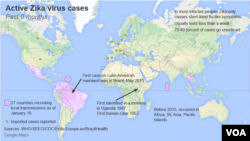A county in the southwestern state of Texas reported what appears to be the first case of the Zika virus being transmitted in the United States by sexual contact.
Officials in Dallas County said Tuesday the patient was infected with Zika after having sexual contact with a sick individual who returned from a country where the virus is present.
The county later reported on Twitter that the infected person had recently traveled to Venezuela.
The U.S. Centers for Disease Control and Prevention — the top federal public health agency — has confirmed the Texas case initially reported.
Dr. Tom Frieden, head of the CDC, confirmed via Twitter message Tuesday that the reported case was transmitted to the infected person's sexual partner, who had not left the United States.
And in an email to VOA, the CDC said it "confirmed through laboratory testing the first U.S. case of Zika virus infection in a non-traveler in the continental United States."
It said that in this case, there was no risk to a developing fetus.
Brazilian President Dilma Rousseff told lawmakers Tuesday her government will spare no expense in fighting the mosquito that experts say carries the virus and poses the greatest danger to pregnant women.
"My entire government is working on fighting this emergency. There will be no lack of funding and I'm certain that I will be able to count on the Congress' support," she said in a speech. "We will partner up with the U.S. government, with President [Barack] Obama with whom we have spoken, to establish our capacity and improve it in order to develop as quickly as possible a vaccine for the Zika virus."
French pharmaceutical company Sanofi said Tuesday it has begun research and development of a vaccine for the virus, which is named for a forest in Uganda where the mosquito-borne virus was first identified in 1947.
There is currently no treatment for Zika.
Threat to pregnant women
It causes no symptoms in 80 percent of people bitten by the Aedes mosquito, but is a threat to pregnant women.
The World Health Organization said the virus is strongly suspected to cause microcephaly — a disease that causes babies to be born with abnormally small heads.
The WHO has declared the Zika virus a global public health emergency and predicts 4 million people could be infected between now and the end of the year.
Twenty-four countries confirmed Zika cases at the end of January, mostly in Central and South America. But that list is almost certain to grow because of global travel.
Chile reported its first case of the virus Tuesday in a man who traveled abroad.
Zika is of greatest concern in Brazil, where the virus was found last year. Brazil has reported nearly 4,000 suspected cases of microcephaly since October, with only 150 cases in 2014.
Brazil also is hosting this year's Summer Olympic games.
The International Red Cross is calling for $2.3 million in emergency funding to combat Zika in Latin America.
WATCH: Who advice for pregnant women










